Daily Vocabulary Words: List of Daily Used Words in Leading Indian Newspapers
Hi there. Welcome to this special section @ Wordpandit. Our endeavour here is straightforward: highlighting daily vocabulary words that you would come across in leading newspapers in the country. We have included the following newspapers in our selection:
• The Times of India
• The Economic Times
• Hindustan Times
• Mint
• Indian Express
We are putting in extensive work to develop your vocabulary. All you have to do is be regular with this section and check out this post daily. This is your repository of commonly used words; essentially, we are posting a list of daily used words. Hence, this has significant practical application as it teaches you words that are commonly used in leading publications mentioned above.
Visit the website daily to learn words from leading Indian newspapers.
WORD-1: Pertinently
CONTEXT: He has pertinently observed that the geographical arrangement of the four dhams, 12 jyotirlingas, and the concept of our Shaktipeeths connecting different corners of our country is an expression of Ek Bharat, Shreshtha Bharat spirit.
SOURCE: Hindustan times
EXPLANATORY PARAGRAPH: Pertinently is like talking about something that is really related to what is being discussed. It’s like answering the question about your favorite food with “pizza” instead of talking about your favorite game.
MEANING: Relating directly to the matter at hand; relevantly (adverb).
PRONUNCIATION: per-tin-ent-ly
SYNONYMS: Relevantly, Appropriately, Suitably, Aptly, To the Point.
USAGE EXAMPLES:
1. She answered the question pertinently.
2. His comments were always pertinently made.
3. The article discussed the issue pertinently.
4. He pertinently pointed out the main problem.
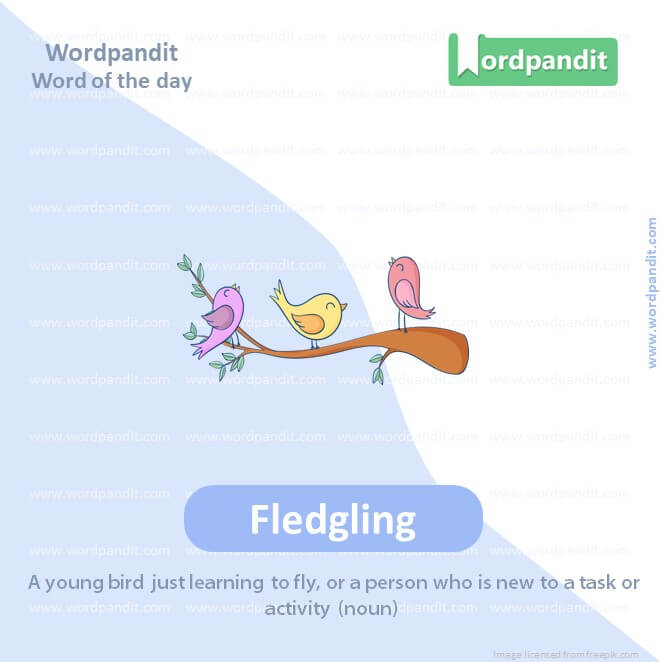
WORD-2: Fledgling
CONTEXT: His fledgling party polled about 3 percent votes and won four seats.
SOURCE: Hindustan times
EXPLANATORY PARAGRAPH: Fledgling is like a baby bird that is just learning to fly. It can also mean someone who is new at doing something, like you are a fledgling at riding a bike.
MEANING: A young bird just learning to fly, or a person who is new to a task or activity (noun).
PRONUNCIATION: fledj-ling
SYNONYMS: Newcomer, Novice, Beginner, Rookie, Tyro.
USAGE EXAMPLES:
1. The fledgling struggled to take its first flight.
2. She was a fledgling writer, new to the craft.
3. His business was still a fledgling, growing slowly.
4. The team was made up of fledgling players.
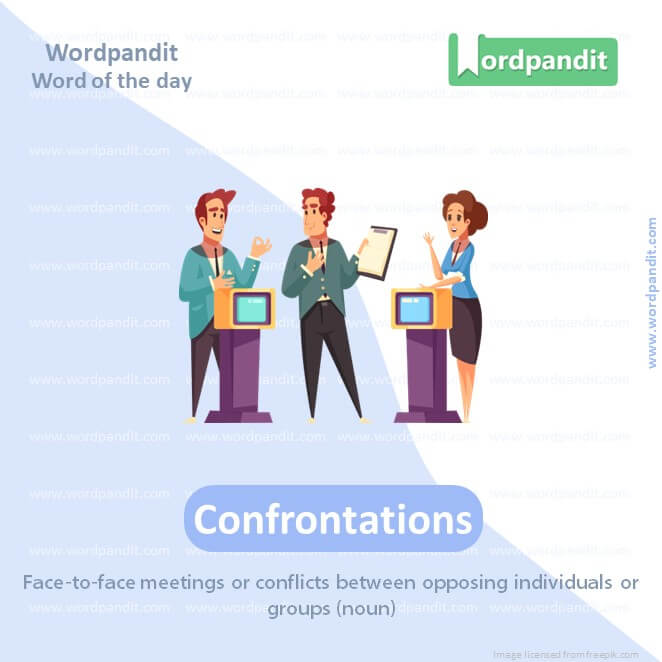
WORD-3: Confrontations
CONTEXT: the damaged image of the Benjamin Netanyahu government could tie up Israel’s resources in its indirect confrontations with Iran.
SOURCE: Hindustan times
EXPLANATORY PARAGRAPH: Confrontations are like disagreements or arguments where people face each other and discuss their problems. It’s like when you and your friend argue about which game to play.
MEANING: Face-to-face meetings or conflicts between opposing individuals or groups (noun).
PRONUNCIATION: con-frun-tay-shuns
SYNONYMS: Conflicts, Clashes, Encounters, Showdowns, Disputes.
USAGE EXAMPLES:
1. The confrontation between the two teams was intense.
2. He tried to avoid confrontations at work.
3. The movie’s climax was a dramatic confrontation.
4. Their confrontation was resolved peacefully.
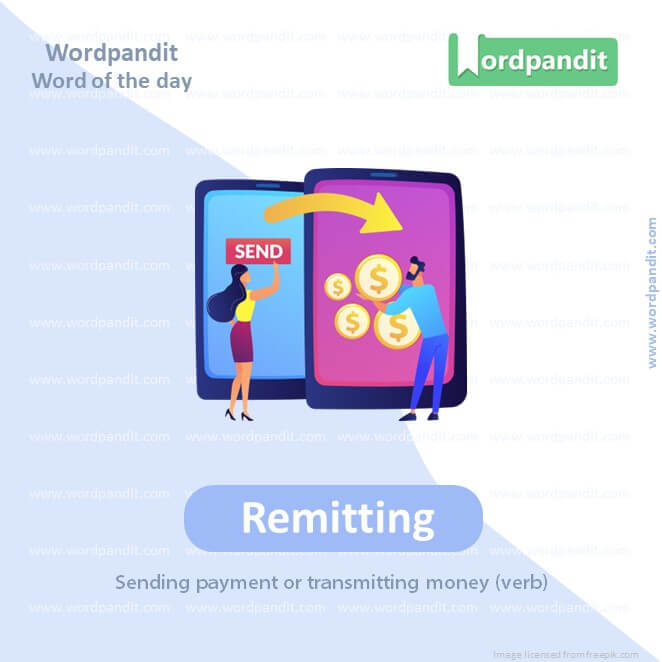
WORD-4: Remitting
CONTEXT: the government of Gujarat passed an order remitting their sentence, setting them free.
SOURCE: Hindustan times
EXPLANATORY PARAGRAPH: Remitting is like sending something, especially money, to someone. It’s like when mom sends money through her phone to pay for the pizza.
MEANING: Sending payment or transmitting money (verb).
PRONUNCIATION: re-mit-ting
SYNONYMS: Sending, Transmitting, Dispatching, Forwarding, Transferring.
USAGE EXAMPLES:
1. He was remitting funds to his family overseas.
2. The company is remitting the payment today.
3. After remitting the application fee, she awaited confirmation.
4. Remitting the owed amount resolved the issue.
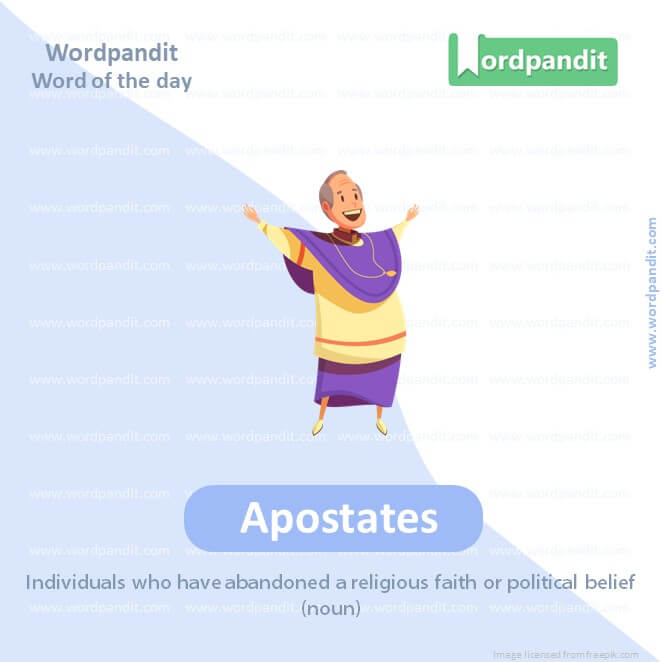
WORD-5: Apostates
CONTEXT: these groups bore a militant aversion to minority Shia Muslims, considered heretical apostates by Salafi and Sunni orthodoxy.
SOURCE: Hindustan times
EXPLANATORY PARAGRAPH: Apostates are people who stop following or believing in what they used to, like if you loved a certain game and then decided you didn’t like it anymore.
MEANING: Individuals who have abandoned a religious faith or political belief (noun).
PRONUNCIATION: a-pos-tates
SYNONYMS: Defectors, Deserters, Renegades, Turncoats, Recusants.
USAGE EXAMPLES:
1. The book discussed famous apostates in history.
2. He was considered an apostate for changing his beliefs.
3. Apostates often face criticism from their former groups.
4. Her study focused on the motivations of apostates.
WORD-6: Discretion
CONTEXT: The government is thus granted the discretion to remit sentences and reintegrate a convicted individual back into society.
SOURCE: Hindustan times
EXPLANATORY PARAGRAPH: Discretion is like thinking carefully before you do or say something. It’s being wise about your choices, like choosing to not touch a hot stove.
MEANING: The quality of behaving or speaking in such a way as to avoid causing offense or revealing confidential information (noun).
PRONUNCIATION: dis-cre-shun
SYNONYMS: Prudence, Judgement, Caution, Tact, Diplomacy.
USAGE EXAMPLES:
1. He handled the situation with great discretion.
2. Discretion is important when dealing with sensitive matters.
3. She exercised discretion in not revealing the secret.
4. The teacher advised discretion in discussing the issue.
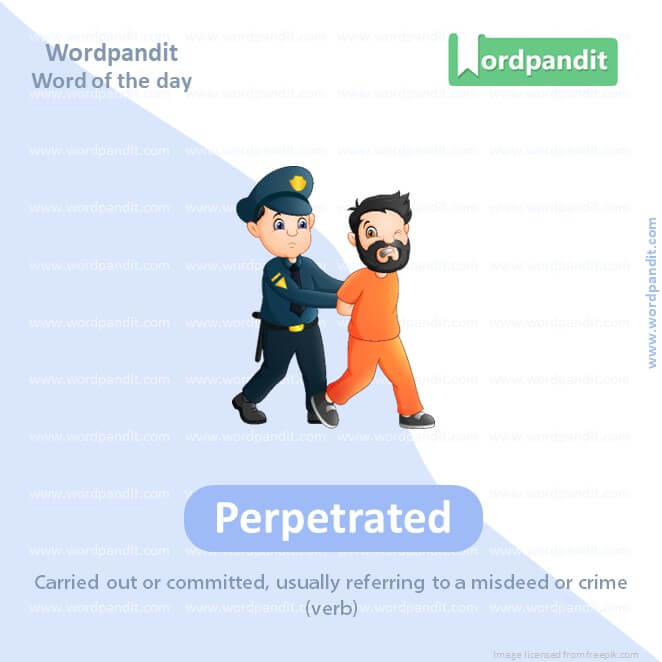
WORD-7: Perpetrated
CONTEXT: Although Iran-backed forces have perpetrated several crimes against Iraqi Sunnis in the past, IS displayed its sectarian ruthlessness in massacres like that of Camp Speicher in 2014.
SOURCE: Hindustan times
EXPLANATORY PARAGRAPH: Perpetrated is like doing something that is not good or right, like when someone takes something that doesn’t belong to them.
MEANING: Carried out or committed, usually referring to a misdeed or crime (verb).
PRONUNCIATION: per-pe-tray-ted
SYNONYMS: Committed, Executed, Performed, Enacted, Inflicted.
USAGE EXAMPLES:
1. The crime was perpetrated by an unknown individual.
2. She was accused of having perpetrated the fraud.
3. The act was perpetrated in broad daylight.
4. He regretted the deed he had perpetrated.
WORD-8: Unceremoniously
CONTEXT: He quit the party after he was unceremoniously removed from the chief minister’s post in 1999.
SOURCE: Hindustan times
EXPLANATORY PARAGRAPH: Unceremoniously is like doing something in a way that is not polite or respectful. It’s like someone interrupting you when you’re talking, without saying ‘excuse me’.
MEANING: Done in a rude or abrupt manner, without the usual formalities (adverb).
PRONUNCIATION: un-ser-eh-moan-ee-us-ly
SYNONYMS: Abruptly, Rudely, Bluntly, Brusquely, Hastily.
USAGE EXAMPLES:
1. He was unceremoniously dismissed from his job.
2. The decision was made unceremoniously.
3. She was unceremoniously escorted out of the meeting.
4. The guests left unceremoniously after the argument.
WORD-9: Contingency
CONTEXT: The then Prime Minister PV Narasimha Rao did not accept a comprehensive contingency plan of the home ministry prepared before the demolition.
SOURCE: Hindustan times
EXPLANATORY PARAGRAPH: Contingency is like having a backup plan or something extra just in case something goes wrong. It’s like bringing an umbrella in case it rains.
MEANING: A future event or circumstance that is possible but cannot be predicted with certainty (noun).
PRONUNCIATION: con-tin-gen-cy
SYNONYMS: Possibility, Eventuality, Probability, Chance, Emergency.
USAGE EXAMPLES:
1. They prepared for any contingency during the expedition.
2. The company set aside funds for contingency.
3. In contingency, they had a backup plan.
4. Contingency measures were in place for the event.
WORD-10: Reluctant
CONTEXT.: Sonia Gandhi, who had been reluctant to enter politics after the assassination of her husband and late Prime Minister Rajiv Gandhi in 1991, finally took the plunge in 1997 and with that Rao’s era ended.
SOURCE: Hindustan times
EXPLANATORY PARAGRAPH: Reluctant is when you don’t really want to do something. It’s like feeling shy or unsure about jumping into the pool for the first time.
MEANING: Unwilling or hesitant; disinclined (adjective).
PRONUNCIATION: re-luc-tant
SYNONYMS: Hesitant, Unwilling, Resistant, Disinclined, Averse.
USAGE EXAMPLES:
1. She was reluctant to speak in front of the class.
2. He gave a reluctant nod in agreement.
3. They were reluctant to make changes.
4. Despite being reluctant, she eventually joined the team.
Vocabulary Daily
Language learning is a beautiful yet complex dance, where ‘vocabulary daily’ connote the integral beats. These everyday words form the essence of most of our conversations and are the cornerstone of effective communication. However, a methodical approach is required to efficiently learn ‘vocabulary daily’.
One key approach to learning ‘vocabulary daily’ is consistency. Engaging with a few words every day consistently fosters better understanding and recall than sporadic cramming sessions.
Interactive tools can add a touch of excitement and ease to mastering ‘vocabulary daily’. Flashcards, word of the day calendars, language learning apps can make the learning experience fun and fruitful. These tools not only introduce new words but often provide a context of use, aiding your understanding.
Making ‘vocabulary daily’ a part of your daily life is a surefire success strategy. Incorporating these words into day-to-day conversations, writing, or social media interactions greatly enhances retention and usage. It also allows you to witness firsthand the impact of a rich vocabulary on the clarity of expression.
To effectively grasp ‘vocabulary daily’, always keep a learner’s curiosity. Explore books, news articles, music, and podcasts in the respective language. This exposure helps in absorbing the words in a real-world context, thus building a robust bond with ‘vocabulary daily’.
In conclusion, understanding ‘vocabulary daily’ is an ongoing process that necessitates consistency, interactive learning, practical application, and a learner’s curiosity. By following this comprehensive approach, the task of mastering ‘vocabulary daily’ becomes less of a chore and more of an enriching journey that can lead to eloquent and effective communication. So, step into the exciting world of ‘vocabulary daily’ and let it colour your language learning adventure with shades of clarity, confidence, and joy.













